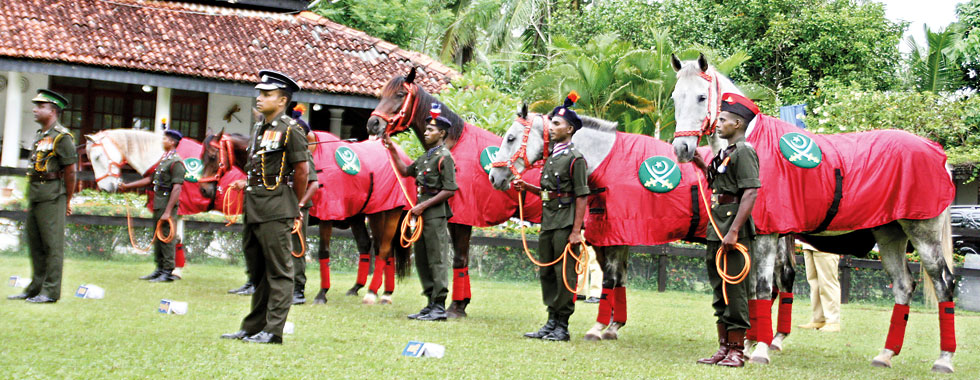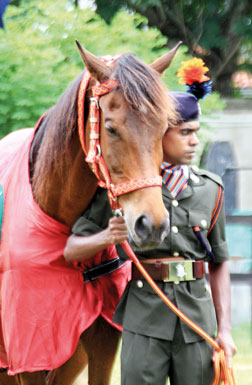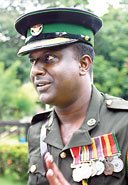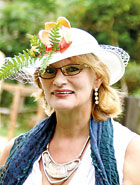Trotting into history
For the first time the Sri Lanka Army with the support of the Pakistani military gets its own Cavalry Unit and Horse Riding Club
There are six placards on the ground, swaying in the chilly breeze that comes over the Hokandara lake. As we try to catch a glimpse of what’s written on them, the compere’s voice booms over the microphone. “Dhavalaraja.. Abhaya.. Chethiya.. Nandhi.. Bharana.. Kaalavela,” he calls out and one-by-one six magnificent horses stride forward and take their places in front of the placards, while six men attired in what seems to be Pakistani traditional clothing line up alongside the horses.

A new chapter: The horses from Pakistan handed over to the Sri Lankan Cavalry Unit. Pix by Indika Handuwala
The ceremony that unfolded before us on that morning of May 13, was history in the making, as the Sri Lanka Army inaugurated their first Cavalry Unit and Horse Riding Club – a generous gift of friendship from the Pakistani military. Three Army officers and three soldiers marched out and the horses were officially handed over to them – they were sworn in as the rightful protectors of these horses.
The names of these horses were carefully selected considering the great horse-warriors and kings whose names are writ prominently in the history of the land. “Return of cavalry, revival of a tradition” is the theme, and it’s a fitting match to the gallant history of our forefathers. In the chronicles of Mahavansa, much has been said about the great warrior Velusumana and a wild, carefree horse who only heeded his call. The horse-riding skills of King Dutugemunu are also supposed to have aided him in his battles. It was said that a horse would pick its master and give everything it has to offer in the battle.

Close bond: ‘Abhaya’ and his handler
Pakistan is a land rich with a horse-riding culture. In 326 BC, when Alexander the Great emerged triumphant in a battle that pitted horses against elephants, he was dubbed, “Skanda of Sikandar”. Long before, wild horses that challenged the wind for speed roamed the cold mountains of what is now Northern Pakistan.
The Cavalry Unit and Horse Riding Club was the brainchild of Army Commander, Lt. General Jagath Jayasooriya, who wanted to add some colour to the general proceedings of the military.
“The need was established and the requirements were given for selecting the right type of horses and that was when the Pakistani Military came forward to give us these horses as a symbol of friendship,” said the Commandant of the Sri Lanka Military Academy, Brigadier Indunil Ranasinghe.
The horses will be at the Military Academy at Diyatalawa, and they will be used for the riding club and ceremonial purposes. “For the first time in Sri Lankan military history, a passing out parade will be commanded by the commanding officer on horseback,” said Brigadier Ranasinghe.
The handing over of these horses was done by the Pakistani Defence Attache, Colonel Sheharyar Pervez Butt, who said this is a testament to the close relationship that the two countries enjoy. “These horses are from the hills of Sargodha, and have been carefully selected, and we will be steadfast in our support to the Sri Lanka Military in looking after them,” he said.
A story of bonding
“Horse riding is more or less an elitist activity in the country, but we’d like to see a day where everyone starts growing a liking for these magnificent beasts,” says Major Nalaka Buddhadasa, who had his first encounter with horses during military training in Pakistan, over 25 years ago. Ever since then, Major Buddhadasa was convinced that he was going to be an equestrian. Indeed, the establishment of the Cavalry Unit and Horse Riding Club with the support of the Pakistani Military is a dream come true for him.

Major Rasika Adhikari
The training programme began in March, under the watchful eyes of Major Buddhadasa and Ineke. Initially 15 soldiers and three officers were part of this programme, and it was nothing less than life-changing experience for them. “They went from being afraid to touch the horses, to loving them with all their hearts in just a couple of weeks,” adds Major Buddhadasa.
Major Rasika Adhikari was one of the most enthusiastic officers involved in the training programme. However he tells us that it was quite the opposite during the first few days of training. “We were given lectures on handling the horses, but we were distracted by the horses and the intimidating thought of handling these large beasts,” he says. “To be honest, I had not even touched a horse before, but now I have an undying passion for them. These are amazing creatures, and they surely grow on you,” he adds.
As the ceremony draws to a close, ‘Abhaya’ the brown horse frets impatiently, neighing loudly. We look on as his handler reaches into his pocket and pulls out a sugar cube. He gives it to ‘Abhaya’ and speaks a few gentle words into the horse’s ear. The animal quietens and calmness ensues. Such is the powerful bond that has been forged.
The lady of the horses
The horses will move to Diyatalawa, but the ceremony was held at the Hokandara stables of British national Ineke Pitts – one of the three people behind the training of the handlers. Ineke has lived in Sri Lanka for the past 15 years. “The reason for having the ceremony here is that this is where the horses were trained,” says Ineke, who took on the challenge of training 18 Army officers in the proper handling of these horses, along with ex-Army officer Major Nalaka Buddhadasa and BHS (British Horse Standard) qualified instructor Gina Porter from the UK.

Ineke: Building trust is important
Ineke learnt the fundamentals of horse-riding at the prestigious British Horse Riding Club of which she is a long-standing member. However, her love for horses races back a long way. Ineke was only 10 when she started riding. It was a lifetime romance for her.
She remembers the Saturday mornings of her childhood, when she would head to the stables at dawn and start cleaning up. She would literally ‘pick up the muck’ in order to earn her ride, but a few hearty neighs from the horses would assure her that it was all worthwhile. “You have to build enough confidence in the heart of a horse. You have to be the horse’s protector, and once it has established that, it will do anything for you,” she says.
Horses are amongst the most sociable animals and can get their hooves clapping for attention. “Building a relationship with a horse is very important, as it will only be loyal to you once trust is forged,” says Ineke. We learn that horses have highly complicated digestive systems, and are prone to sickness – in which time love and care is absolutely necessary.
“The whole idea is to improve equestrian practices here, and inculcate a horse riding culture,” she explains. “More than 90% of the horses currently bred in Sri Lanka are used for the purposes of racing -we want to break free from that norm,” she adds.
The idea of bringing in British horse riding standards was to raise the bar in the handling of these horses. “If we were going to train them, we wanted to make sure that it would be in the best possible manner and no compromises would be made,” Ineke enthuses.
Ineke is a die-hard lover of all horses, but the horse who has galloped its way to a special place in her heart is one that goes by the name of ‘Candle in the wind’ – an 18-year-old ex-race horse.
“She was in the racing circuit in Nuwara Eliya, but time caught up with her when she developed arthritis,” Ineke recalls. She personally took her out of the racing circuit, and made a commitment to look after the horse. “She’s an absolute darling, and now she struts around like a proud primadonna. She’s definitely not acting her age,” she laughs. “Everyday is a day well-spent in their company,” she says of the horses.
Follow @timesonlinelk
comments powered by Disqus


